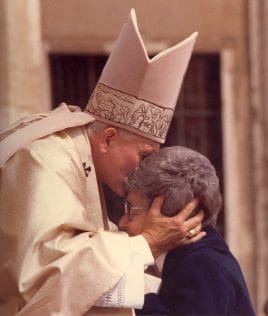
Dec 14, 2017 | Focolare Worldwide
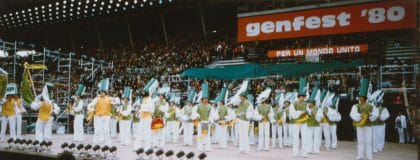 I was born in Bergamo,(Italy), the first of four children in a beautiful family with solid Christian roots. At seventeen I was in high school and involved in the parish. I loved school, helping others and going on trips to the mountains. I had a lot of friends and a rich faith experience. As they used to say back then, I was “good kid,” but … I always felt something was missing. I wanted something beautiful, great and true. Italy was going through hard times with assassination attempts by the Red Brigades and a job crisis. My father who was in metalworking, was laid off and later lost his job. The injustice of it all bothered me, as did the social conflict, but I also could feel being made to renew society. I spent hours talking with friends, debating, but it only left me empty inside.
I was born in Bergamo,(Italy), the first of four children in a beautiful family with solid Christian roots. At seventeen I was in high school and involved in the parish. I loved school, helping others and going on trips to the mountains. I had a lot of friends and a rich faith experience. As they used to say back then, I was “good kid,” but … I always felt something was missing. I wanted something beautiful, great and true. Italy was going through hard times with assassination attempts by the Red Brigades and a job crisis. My father who was in metalworking, was laid off and later lost his job. The injustice of it all bothered me, as did the social conflict, but I also could feel being made to renew society. I spent hours talking with friends, debating, but it only left me empty inside. 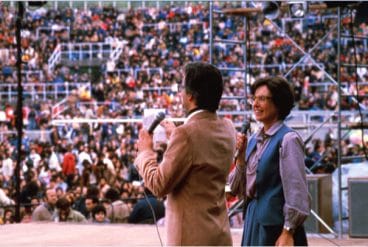 One day, Anita, a girl from the parish, invited me and my sister to the Genfest that was going to be held in Rome. She told me we’d meet thousands of young people from other countries and also the Pope. There was something special about Anita, a special joy and sincerity that shone in her eyes and, like others at the parish – the priest, two catechists and a seminarian – she seemed to have a secret: they were always open to everyone, willing and really able to listen. With a good dose of unawareness my sister and I took off on a bus with a hundred young people from the parish and headed for the Genfest in Rome. We arrived late at the Flaminio Stadium because of an accident and wound up sitting in the last rows on the highest seats where there was no roof – and we were very far from the stage that had a sign that read: For A United World. It was pouring rain, and I was drenched. I began to ask myself why I had ever agreed to such an excursion. But just then some young people from Switzerland who were sitting just below us, offered us some plastic sheeting to cover ourselves with; they offered us some food and binoculars, so we could follow the show more easily. We spoke in different languages, but understood one another right away. I experienced the liberty of love freely given, and a great sense of welcome and acceptance. Despite all the rain, colorful dances took turns on stage. It seemed like I had stepped into another dimension. Forty-thousand young people filled with enthusiasm were flowing in from every corner of the world – all of them giving witness to the Gospel they were really living.
One day, Anita, a girl from the parish, invited me and my sister to the Genfest that was going to be held in Rome. She told me we’d meet thousands of young people from other countries and also the Pope. There was something special about Anita, a special joy and sincerity that shone in her eyes and, like others at the parish – the priest, two catechists and a seminarian – she seemed to have a secret: they were always open to everyone, willing and really able to listen. With a good dose of unawareness my sister and I took off on a bus with a hundred young people from the parish and headed for the Genfest in Rome. We arrived late at the Flaminio Stadium because of an accident and wound up sitting in the last rows on the highest seats where there was no roof – and we were very far from the stage that had a sign that read: For A United World. It was pouring rain, and I was drenched. I began to ask myself why I had ever agreed to such an excursion. But just then some young people from Switzerland who were sitting just below us, offered us some plastic sheeting to cover ourselves with; they offered us some food and binoculars, so we could follow the show more easily. We spoke in different languages, but understood one another right away. I experienced the liberty of love freely given, and a great sense of welcome and acceptance. Despite all the rain, colorful dances took turns on stage. It seemed like I had stepped into another dimension. Forty-thousand young people filled with enthusiasm were flowing in from every corner of the world – all of them giving witness to the Gospel they were really living. 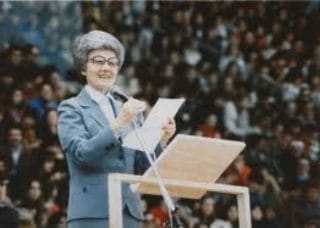 Then a small woman with white hair got on stage. It was Chiara Lubich. I looked at her through binoculars. As soon as she began to speak a deep silence fell over the crowd. I was enraptured more by the sound of her voice than by what she said, by the conviction that emanated from her words, by their power that stood in contrast to her fragile appearance. She spoke of a “moment of God,” and, even though she presented several lists of divisions, breakups and the overall disunity of the human race – she was proclaiming a great ideal: a united world, Jesus’s own ideal. She invited us to bring the divine into the life of society, into the world – through love. Her talk only lasted a few minutes while I found myself being crushed by a feeling I had never had before, which – afterwards – no sorrowful nor difficult event could ever dent in: a united world is possible and I have the amazing possibility of building it with my own life! I had found it! I wanted to live like Chiara, like those young people I was among that afternoon, to have their faith, their push, their joy.
Then a small woman with white hair got on stage. It was Chiara Lubich. I looked at her through binoculars. As soon as she began to speak a deep silence fell over the crowd. I was enraptured more by the sound of her voice than by what she said, by the conviction that emanated from her words, by their power that stood in contrast to her fragile appearance. She spoke of a “moment of God,” and, even though she presented several lists of divisions, breakups and the overall disunity of the human race – she was proclaiming a great ideal: a united world, Jesus’s own ideal. She invited us to bring the divine into the life of society, into the world – through love. Her talk only lasted a few minutes while I found myself being crushed by a feeling I had never had before, which – afterwards – no sorrowful nor difficult event could ever dent in: a united world is possible and I have the amazing possibility of building it with my own life! I had found it! I wanted to live like Chiara, like those young people I was among that afternoon, to have their faith, their push, their joy.  The next day there was a rousing encounter with John Paul II at Saint Peter’s Square. During the return trip home, me – timid as I am – I bombarded the Gen with questions: I wanted to know everything about them! I began to visit them in my city, and the Gen talked to me about their secret: love for Jesus Forsaken in all the large and small sufferings in us and around us. I somehow realized that this was a radical experience of God I was dealing with here, one without half-measures. Jesus Forsaken was calling me to give Him everything, to follow Him. I was filled with an enormous fear: for me it me it was ALL or NOTHING. Strong suffering and pain were never lacking in the months following the Genfest. But the life I had begun with the Gen, the possibility of giving a meaning to pain, the unity among us that was made of concrete love and sharing, helped me to carry on, in spite of every obstacle – in an amazing adventure that widened my heart. I was experiencing that with God among us, all is possible and that the possibility of the unity of the human family was really doable.
The next day there was a rousing encounter with John Paul II at Saint Peter’s Square. During the return trip home, me – timid as I am – I bombarded the Gen with questions: I wanted to know everything about them! I began to visit them in my city, and the Gen talked to me about their secret: love for Jesus Forsaken in all the large and small sufferings in us and around us. I somehow realized that this was a radical experience of God I was dealing with here, one without half-measures. Jesus Forsaken was calling me to give Him everything, to follow Him. I was filled with an enormous fear: for me it me it was ALL or NOTHING. Strong suffering and pain were never lacking in the months following the Genfest. But the life I had begun with the Gen, the possibility of giving a meaning to pain, the unity among us that was made of concrete love and sharing, helped me to carry on, in spite of every obstacle – in an amazing adventure that widened my heart. I was experiencing that with God among us, all is possible and that the possibility of the unity of the human family was really doable.
Patrizia Bertoncello
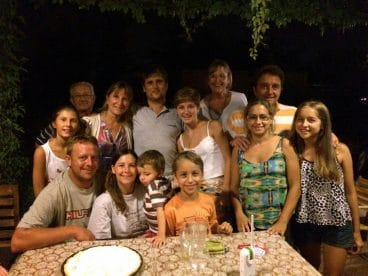
Dec 13, 2017 | Focolare Worldwide
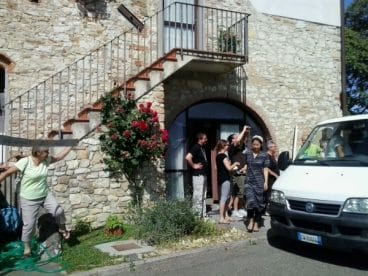 Every beginning of the year, nothing is the same as it was at Loreto School. It’s been that way ever since 1982 when the school was found, because of the different places the families come from each year. Their reasons for going to Loppiano are also different. They rhythm of the course and the work are also adapted to their languages and cultures. Celebrations are enriched by their sounds and colours. The course focuses on topics related to the family within the context of the spirituality of unity and coincide with the children’s scholastic year in the local public schools. Eight families that are currently attending the school come from Japan, Korea, Mexico, Brazil, Colombia, Italy, Argentina and Vietnam. They have one thing in common: the desire to grow in Gospel mutual love. This is the only law that reigns in the Focolare town where the families have come to have a full immersion in the spirituality of unity. “Why did we come here?”, Indian Henke and Emilio di Pelotas try to explain. “To seek the essential in life. We didn’t want to get stuck in the vicious circle of profit, so we inserted our business in the Economy of Communion project (EoC). We sold the car, gave away half of our clothing to the poor along with a few electrical gadgets for the house. It was a drastic move and, as a consequence, we felt the irresistible urge to be formed as a family together with our children in the spirituality of unity.”
Every beginning of the year, nothing is the same as it was at Loreto School. It’s been that way ever since 1982 when the school was found, because of the different places the families come from each year. Their reasons for going to Loppiano are also different. They rhythm of the course and the work are also adapted to their languages and cultures. Celebrations are enriched by their sounds and colours. The course focuses on topics related to the family within the context of the spirituality of unity and coincide with the children’s scholastic year in the local public schools. Eight families that are currently attending the school come from Japan, Korea, Mexico, Brazil, Colombia, Italy, Argentina and Vietnam. They have one thing in common: the desire to grow in Gospel mutual love. This is the only law that reigns in the Focolare town where the families have come to have a full immersion in the spirituality of unity. “Why did we come here?”, Indian Henke and Emilio di Pelotas try to explain. “To seek the essential in life. We didn’t want to get stuck in the vicious circle of profit, so we inserted our business in the Economy of Communion project (EoC). We sold the car, gave away half of our clothing to the poor along with a few electrical gadgets for the house. It was a drastic move and, as a consequence, we felt the irresistible urge to be formed as a family together with our children in the spirituality of unity.” 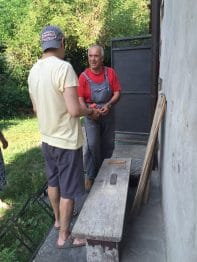 “In order to come here,” says Bao Chau, Vitenamese and father of two boys, “we had to wait four years because of family reasons. We were about to withdraw our enrolment when the obstacles were overcome and we strongly felt that God was waiting for us in Loppiano. We’ve been here since 2016, but because of the language we weren’t able to understand everything that was discussed in the course, so we decided to stay on for another year. I asked me employer; I asked my brothers to help me with the home loan and I asked the school director. Two months later, all the answers came back affirmative.” “We’re glad to stay on,” his wife Bao Vy adds, “to enter more deeply into the life of the Gospel and, when we return home, to share it with other families in Vietnam, so that we can continue to grow together in love.” “We come from Korea, and this is our daughter, 13 year old Maria Grazia. Irema and Michele are the owners of an institute that Michele founded fifteen years ago, to answer to the widespread need for better university preparation. “From the first ten students,” they recount, “in three years there a thousand units. We were overtaken by the work and our plan of building a harmonious and united family began to feel the effects.” After a deep communion among them, in the first days of June the decision was made to look for another kind of work. Then Michele had an idea: “If we sell the Institute we can go to Loppiano for a year!” It was an idea that Irema had right after their wedding, but back then it wasn’t possible. “We had to get sold before vacations. We prayed a lot and, on the last Saturday of June, the Institute was sold. God really wanted us to be here!”
“In order to come here,” says Bao Chau, Vitenamese and father of two boys, “we had to wait four years because of family reasons. We were about to withdraw our enrolment when the obstacles were overcome and we strongly felt that God was waiting for us in Loppiano. We’ve been here since 2016, but because of the language we weren’t able to understand everything that was discussed in the course, so we decided to stay on for another year. I asked me employer; I asked my brothers to help me with the home loan and I asked the school director. Two months later, all the answers came back affirmative.” “We’re glad to stay on,” his wife Bao Vy adds, “to enter more deeply into the life of the Gospel and, when we return home, to share it with other families in Vietnam, so that we can continue to grow together in love.” “We come from Korea, and this is our daughter, 13 year old Maria Grazia. Irema and Michele are the owners of an institute that Michele founded fifteen years ago, to answer to the widespread need for better university preparation. “From the first ten students,” they recount, “in three years there a thousand units. We were overtaken by the work and our plan of building a harmonious and united family began to feel the effects.” After a deep communion among them, in the first days of June the decision was made to look for another kind of work. Then Michele had an idea: “If we sell the Institute we can go to Loppiano for a year!” It was an idea that Irema had right after their wedding, but back then it wasn’t possible. “We had to get sold before vacations. We prayed a lot and, on the last Saturday of June, the Institute was sold. God really wanted us to be here!”  Francesca, 34 years old from Italy, and Roberto, 37 years old from Argentina are also a part of the mosaic. After several experiences in other countries,” they recount, “we are now residents of Italy, in Loreto. In our journey as a family, which has been brief but intense, we were never spared from problems: the different family contexts, several external affairs that were foreign to us and our way of doing things that blocked us a bit, but love and the will to build a healthy open family are strong. So we nurtured the decision to come to Loreto School with three year old Isabel, to learn how to prioritize and grow as parents and people. By living and sharing and being confronted by others, who knows? Maybe one day we will be able to testify to the Gospel out in the world.” Watch Video
Francesca, 34 years old from Italy, and Roberto, 37 years old from Argentina are also a part of the mosaic. After several experiences in other countries,” they recount, “we are now residents of Italy, in Loreto. In our journey as a family, which has been brief but intense, we were never spared from problems: the different family contexts, several external affairs that were foreign to us and our way of doing things that blocked us a bit, but love and the will to build a healthy open family are strong. So we nurtured the decision to come to Loreto School with three year old Isabel, to learn how to prioritize and grow as parents and people. By living and sharing and being confronted by others, who knows? Maybe one day we will be able to testify to the Gospel out in the world.” Watch Video
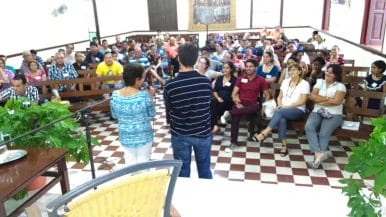
Dec 12, 2017 | Focolare Worldwide
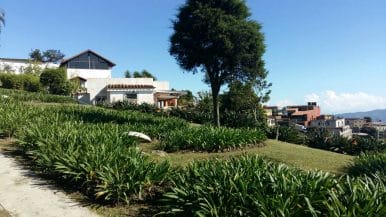 Ongoing emergencies, but also much solidarity and desire to get things going again. It is a difficult socio-political scene in Venezuela: soaring inflation, the persistent increase in the number of people living in extreme poverty, the lack of basic human necessities, and violent clashes. In Cuba and Puerto Rico, recontstruction has been hard because of the exodus of thousands of people, and the lack of electricity and drinking water. Yet, in the midst of it all, the vitality of the Caribbean people and the will to begin again has never faded. María Augusta and José Juan, from the Focolare community in the Carribean region report: “The general situation in Venezuela is quite painful, because of the lack of food and medicines, and also because of the growing uncertainty and helplessness and the continuing exodus of the people who are leaving the country. The list of our friends who have already left and of others who are attempting to leave, is long. In spite of this we have to “stay” at the foot of the cross, in the midst of much suffering, in the hope of a resurrection. But we can already see the Resurrection happening in many people, in their depth and in the Christian solidarity that animates them.”
Ongoing emergencies, but also much solidarity and desire to get things going again. It is a difficult socio-political scene in Venezuela: soaring inflation, the persistent increase in the number of people living in extreme poverty, the lack of basic human necessities, and violent clashes. In Cuba and Puerto Rico, recontstruction has been hard because of the exodus of thousands of people, and the lack of electricity and drinking water. Yet, in the midst of it all, the vitality of the Caribbean people and the will to begin again has never faded. María Augusta and José Juan, from the Focolare community in the Carribean region report: “The general situation in Venezuela is quite painful, because of the lack of food and medicines, and also because of the growing uncertainty and helplessness and the continuing exodus of the people who are leaving the country. The list of our friends who have already left and of others who are attempting to leave, is long. In spite of this we have to “stay” at the foot of the cross, in the midst of much suffering, in the hope of a resurrection. But we can already see the Resurrection happening in many people, in their depth and in the Christian solidarity that animates them.”  Ofelia from the Venezuelan community recounts: “It’s not easy to find answers to the problems we’re facing, like the lack of food, clothing and medicines. But we have Jesus’s words alive in our hearts: ‘Give and there will be gifts for you’, which we can live one day at a time. If someone doesn’t have food to eat, we can share a package of rice or medicine and all the things that we receive in thousands of ways. Each of us thinks of the other, life circulates and the community grows. In the midst of the violence and uncertainty, the presence of Jesus among us is like a flame that attracts and gives hope.” María Augusta e José Juan are always the ones to report on Cuba: “Last weekend a Mariapolis was held in Santiago with around 200 people, a sign of hope that continues to rise in the midst of the many difficulties that everyone has to face.” And from the community in Puerto Rico: “As you know, they have been living through truly tragic months due to the devastating effects of the hurricaine which destroyed the island. Very touching testimonies of Gospel love continue to arrive.” Here are a few: “Fifty six days without water, and electricity for only 30 minutes a day. It’s not easy to work in the office with the intense heat, but we do it! The flashlight provides a bit of light, the water bottles can be left in the afternoon sun, so that one has a bit of warm water to bathe with. For the heat, a hand fan or spray bottle of water and alcohol can provide some refreshment…” “Some young people from the Movement and the Inmaculado Corazón de María Parish in Patillas, along with some students from Saint Ignatius College have distributed rations to the needy – 237 sacks of food in all.” “My experience at Palma Sola was quite hard because of the destruction and lack of everything. Offering my service, with my entire family, was the most beautiful thing I’ve ever done in my life.” “We always have something to give, evaluating what we really need and offering the rest to the people who are more in need.” “We went to the Recio community in the Guardarraya di Patillas barrio. It was hard to get there because of the condition of the roads after the hurricaine. Beginning from the outskirts where there was total devastation, we found elderly people with tired and discouraged expressions, people with asthma problems, ulcers on their legs, diabetics (and the problem of finding a way to conserve the insulin without electricity), people suffering from high blood pressure… One boy had a skin allergy. We made an attempt to use the old community aquaduct to make up for the lack of water.” “In Gurabo we were able to know our neighbours better by helping them in their need.” “Carrying on and getting on our feet again doesn’t only depend on the government, nor the military, nor help from abroad. It also depends on us, on me, on you. Together, we’ll get it done!”
Ofelia from the Venezuelan community recounts: “It’s not easy to find answers to the problems we’re facing, like the lack of food, clothing and medicines. But we have Jesus’s words alive in our hearts: ‘Give and there will be gifts for you’, which we can live one day at a time. If someone doesn’t have food to eat, we can share a package of rice or medicine and all the things that we receive in thousands of ways. Each of us thinks of the other, life circulates and the community grows. In the midst of the violence and uncertainty, the presence of Jesus among us is like a flame that attracts and gives hope.” María Augusta e José Juan are always the ones to report on Cuba: “Last weekend a Mariapolis was held in Santiago with around 200 people, a sign of hope that continues to rise in the midst of the many difficulties that everyone has to face.” And from the community in Puerto Rico: “As you know, they have been living through truly tragic months due to the devastating effects of the hurricaine which destroyed the island. Very touching testimonies of Gospel love continue to arrive.” Here are a few: “Fifty six days without water, and electricity for only 30 minutes a day. It’s not easy to work in the office with the intense heat, but we do it! The flashlight provides a bit of light, the water bottles can be left in the afternoon sun, so that one has a bit of warm water to bathe with. For the heat, a hand fan or spray bottle of water and alcohol can provide some refreshment…” “Some young people from the Movement and the Inmaculado Corazón de María Parish in Patillas, along with some students from Saint Ignatius College have distributed rations to the needy – 237 sacks of food in all.” “My experience at Palma Sola was quite hard because of the destruction and lack of everything. Offering my service, with my entire family, was the most beautiful thing I’ve ever done in my life.” “We always have something to give, evaluating what we really need and offering the rest to the people who are more in need.” “We went to the Recio community in the Guardarraya di Patillas barrio. It was hard to get there because of the condition of the roads after the hurricaine. Beginning from the outskirts where there was total devastation, we found elderly people with tired and discouraged expressions, people with asthma problems, ulcers on their legs, diabetics (and the problem of finding a way to conserve the insulin without electricity), people suffering from high blood pressure… One boy had a skin allergy. We made an attempt to use the old community aquaduct to make up for the lack of water.” “In Gurabo we were able to know our neighbours better by helping them in their need.” “Carrying on and getting on our feet again doesn’t only depend on the government, nor the military, nor help from abroad. It also depends on us, on me, on you. Together, we’ll get it done!”
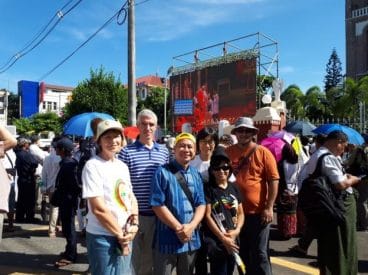
Dec 8, 2017 | Focolare Worldwide
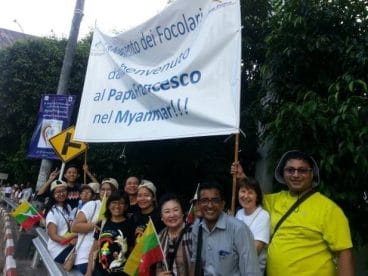 Peace, respect for the dignity of every people, and dialogue were some of the lofty goals left by Pope Francis to the populations he visited during his recent trip in Asia. Testimonies from the Focolare community have begun to arrive from Myanmar in recent days where, together with others, they were involved in taking care of different aspects of the trip – things like translations, maintaining order, health care, and the orchestra. Here are a few of the reports: “Pope Francis’s coming was a dream come true for us. It took a while for the amazement to become conscious awareness of what was really happening.” “The tears streamed down the cheeks of the elderly. But also the youth, for whom it was more difficult to grasp what was taking place, were overjoyed.” The small minority of Catholics in the country felt encouraged: “We were a little flock and isolated. Finally we saw our shepherd up close. These people are no longer on the margins, but under the world spotlight. Finally something happened to be proud of. The Pope is in Myanmar.” “We don’t have to be afraid of anything anymore.”
Peace, respect for the dignity of every people, and dialogue were some of the lofty goals left by Pope Francis to the populations he visited during his recent trip in Asia. Testimonies from the Focolare community have begun to arrive from Myanmar in recent days where, together with others, they were involved in taking care of different aspects of the trip – things like translations, maintaining order, health care, and the orchestra. Here are a few of the reports: “Pope Francis’s coming was a dream come true for us. It took a while for the amazement to become conscious awareness of what was really happening.” “The tears streamed down the cheeks of the elderly. But also the youth, for whom it was more difficult to grasp what was taking place, were overjoyed.” The small minority of Catholics in the country felt encouraged: “We were a little flock and isolated. Finally we saw our shepherd up close. These people are no longer on the margins, but under the world spotlight. Finally something happened to be proud of. The Pope is in Myanmar.” “We don’t have to be afraid of anything anymore.” 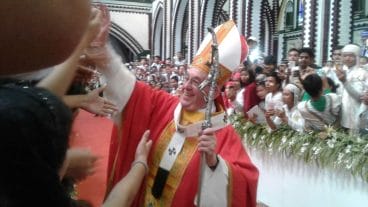 Gennie works with Internally Displaced Persons (IDP), civilians who are forced to escape persecutions and, unlike refugees, haven’t crossed international borders. In the majority of cases, while waiting for a new life, they’re deprived of help and protection. After Pope Francis’s visit, she writes: “Today this hope is renewed. “My own personal hope is in Love, and from now on it will be more and more alive in me.” “On November 28 we left with a group of a hundred people from the farthest villages of the country. We travelled in at least five buses. “The trip was organized by our parish. Seeing the Pope was like a dream for us. We left at nine o’clock in the morning and travelled for ten hours. We were full of enthusiasm, we prayed and sang. We took a short-cut, but it took all of us around twenty hours to get there because we didn’t want to let our friends fall behind and be on their own. But nobody complained about that.”
Gennie works with Internally Displaced Persons (IDP), civilians who are forced to escape persecutions and, unlike refugees, haven’t crossed international borders. In the majority of cases, while waiting for a new life, they’re deprived of help and protection. After Pope Francis’s visit, she writes: “Today this hope is renewed. “My own personal hope is in Love, and from now on it will be more and more alive in me.” “On November 28 we left with a group of a hundred people from the farthest villages of the country. We travelled in at least five buses. “The trip was organized by our parish. Seeing the Pope was like a dream for us. We left at nine o’clock in the morning and travelled for ten hours. We were full of enthusiasm, we prayed and sang. We took a short-cut, but it took all of us around twenty hours to get there because we didn’t want to let our friends fall behind and be on their own. But nobody complained about that.” 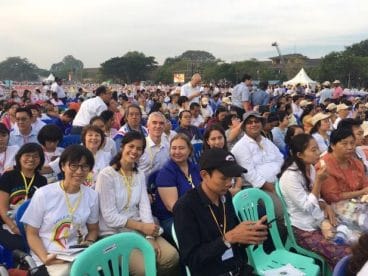 The group reached Kyaikkasan Ground of Yangon at around 5:30 in the morning as Mass was about to begin. It was attended not only by the small Catholic minority, but also by Muslims, Buddhists and faithful of different religions. “Our group couldn’t get in, but we found a spot near one of the entrances. Through the Pope we were able to feel the Church’s love for the smallest flock. You could sense a very strong love also among the whole population, not only among the Christians. Our taxi driver told us that he had been driving people for free to the stadium since early morning, and that the public trains were doing the same.” One Buddhist youth, who had just attended the Mass, wrote: “Here too I felt I was in a family. I notice a deep peace in my heart.”
The group reached Kyaikkasan Ground of Yangon at around 5:30 in the morning as Mass was about to begin. It was attended not only by the small Catholic minority, but also by Muslims, Buddhists and faithful of different religions. “Our group couldn’t get in, but we found a spot near one of the entrances. Through the Pope we were able to feel the Church’s love for the smallest flock. You could sense a very strong love also among the whole population, not only among the Christians. Our taxi driver told us that he had been driving people for free to the stadium since early morning, and that the public trains were doing the same.” One Buddhist youth, who had just attended the Mass, wrote: “Here too I felt I was in a family. I notice a deep peace in my heart.”  Gennie continues: “The new criteria that should be observed from now on are totally topsy turvey and new: the VIPs are all there in the Magnificat . . . He has raised up the lowly . . . filled the hungry with good things.” “We have to thank everyone for this experience – the Yangonians, who were always so patient with the crowd; the people who prepared the event, but especially Pope Francis who made the decision to come to such a far-away land. It’s a new daybreak for Myanmar.” Valentina is a medical doctor. She and other doctors lent their services to help with the health care. “It was an occasion that put us together, without borders. We Catholic and non-Catholic doctors worked straight through and were very tired, but we received a sort of grace, that of being able to love without stopping.” Jerome worked as a translator: “For me it was especially beautiful to see the youth waiting from early in the morning at the Cathedral of St Mary in Yangon. At the end of the Mass the Pope turned to us with lots of encouragement for us to work or peace. I now feel called to greater generosity, to be joyful and brave as he asked us to be.”
Gennie continues: “The new criteria that should be observed from now on are totally topsy turvey and new: the VIPs are all there in the Magnificat . . . He has raised up the lowly . . . filled the hungry with good things.” “We have to thank everyone for this experience – the Yangonians, who were always so patient with the crowd; the people who prepared the event, but especially Pope Francis who made the decision to come to such a far-away land. It’s a new daybreak for Myanmar.” Valentina is a medical doctor. She and other doctors lent their services to help with the health care. “It was an occasion that put us together, without borders. We Catholic and non-Catholic doctors worked straight through and were very tired, but we received a sort of grace, that of being able to love without stopping.” Jerome worked as a translator: “For me it was especially beautiful to see the youth waiting from early in the morning at the Cathedral of St Mary in Yangon. At the end of the Mass the Pope turned to us with lots of encouragement for us to work or peace. I now feel called to greater generosity, to be joyful and brave as he asked us to be.”
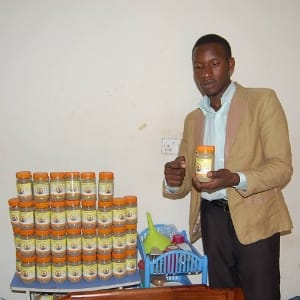
Dec 4, 2017 | Focolare Worldwide
 Masaka, Kampala, Entebbe and great Lake Victoria – this is the wide territory that Henry has covered in his country, Uganda, the “pearl of Africa.” He’s gone from the village where he was born, to his economic studies at university in the capitol, to the shores of the largest lake on the continent. It is so large that it counts more than 3,000 islands. This is where the White Nile begins, which then flows into the longest river in Africa, the Nile. Everything is big in Uganda: the parks, the impenetrable forests, the nature reserves. Henry dreams big too. “At Masaka, where I went to university, I noticed how people didn’t have time to cook anymore,” he says. To resolve the problem, Henry started a business to produce meat and fish products. At just 24, together with two others his age, he started the Sseruh Food Processing Company Ltd. in Entebbe. On the other side of the world, in Argentina, another entrepreneur, Gonzalo Perrin, had already started a company some years ago: Pasticcino, which produces cookies for a number of cafeteria chains and coffee roasters. Urged on by the spirit of the Economy of Communion, Perrin moved to the Soladaridad industrial park at Mariapolis Lia, a little city of the Focolare. There he promotes a culture marked by the values of reciprocity, care for the disadvantaged and the environment.
Masaka, Kampala, Entebbe and great Lake Victoria – this is the wide territory that Henry has covered in his country, Uganda, the “pearl of Africa.” He’s gone from the village where he was born, to his economic studies at university in the capitol, to the shores of the largest lake on the continent. It is so large that it counts more than 3,000 islands. This is where the White Nile begins, which then flows into the longest river in Africa, the Nile. Everything is big in Uganda: the parks, the impenetrable forests, the nature reserves. Henry dreams big too. “At Masaka, where I went to university, I noticed how people didn’t have time to cook anymore,” he says. To resolve the problem, Henry started a business to produce meat and fish products. At just 24, together with two others his age, he started the Sseruh Food Processing Company Ltd. in Entebbe. On the other side of the world, in Argentina, another entrepreneur, Gonzalo Perrin, had already started a company some years ago: Pasticcino, which produces cookies for a number of cafeteria chains and coffee roasters. Urged on by the spirit of the Economy of Communion, Perrin moved to the Soladaridad industrial park at Mariapolis Lia, a little city of the Focolare. There he promotes a culture marked by the values of reciprocity, care for the disadvantaged and the environment.
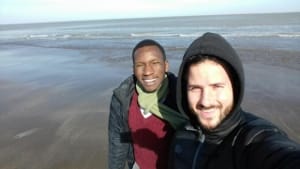
Henry Sserugo and Gonzalo Perrin

Henry shows the fish products of the Sseruh Food Processing Company Ltd
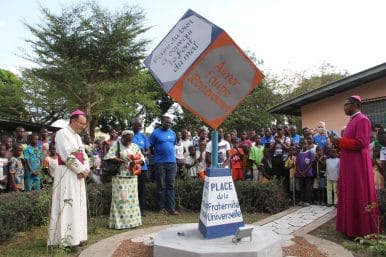
Nov 30, 2017 | Focolare Worldwide
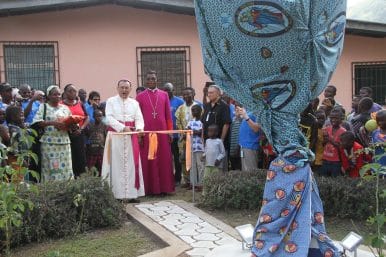 The blessing of Pope Francis unexpectedly reaches the citizens of Mariapolis Victoria, a small oasis of peace in the city of Man, Ivory Coast as it celebrates its Silver Anniversary. It arrived with a thank you for the work of evangelisation that has been carried out in that place.” Francis invited them to “persevere with courage in the service of unity and concord among people,” and to continue “along the path of an ever-more universal fraternity. This place is dotted with episodes of fraternity, beginning from the civil war of 2002-2003 when the locals decided to stay. Also the European focolarini, even though the local authorities urged foreigners to leave the country. It was a witness of loving their own to the end, of opening their doors to protect people, and 3,500 Muslims and Christians passed through those doors in those months. These were people who risked their lives, like Salvatore, Rino, Charles, put against the wall, ready to be shot: “All you can do now is pray!” they told them. But they managed to pull it off. Now the city and the country has turned the page, even if there isn’t complete political reconcilliation.
The blessing of Pope Francis unexpectedly reaches the citizens of Mariapolis Victoria, a small oasis of peace in the city of Man, Ivory Coast as it celebrates its Silver Anniversary. It arrived with a thank you for the work of evangelisation that has been carried out in that place.” Francis invited them to “persevere with courage in the service of unity and concord among people,” and to continue “along the path of an ever-more universal fraternity. This place is dotted with episodes of fraternity, beginning from the civil war of 2002-2003 when the locals decided to stay. Also the European focolarini, even though the local authorities urged foreigners to leave the country. It was a witness of loving their own to the end, of opening their doors to protect people, and 3,500 Muslims and Christians passed through those doors in those months. These were people who risked their lives, like Salvatore, Rino, Charles, put against the wall, ready to be shot: “All you can do now is pray!” they told them. But they managed to pull it off. Now the city and the country has turned the page, even if there isn’t complete political reconcilliation. 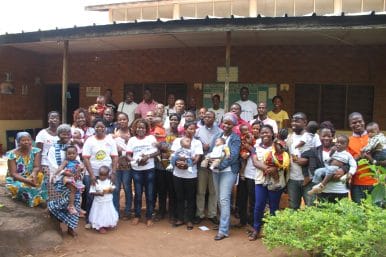 But Mariapolis Victoria is not only an oasis of peace in times of war. It is a social laboratory. During the three-day celebration in honour of the 25th anniversary, the focus was on facts and deeds. Visits to the activities of the town were on top of the schedule: the Medical Social Centre – renovated and enlarged, with emergency services and impatient hospital, a dental clinic, a physiotherapist – the nutrition centre where the wounds of infant malnutrition are cured, and mothers are taught nutritional care; the computer centre and more and more specialized courses – along with other entrepreneurial activities like carpentry and printing. A football tournament was held during the preparations for the 25th anniversary in the name of fraternity and fair play. On Sunday, November 19th the prizes were finally given to the winners, not only for the goals they gained, but also for the points they earned for fair play.
But Mariapolis Victoria is not only an oasis of peace in times of war. It is a social laboratory. During the three-day celebration in honour of the 25th anniversary, the focus was on facts and deeds. Visits to the activities of the town were on top of the schedule: the Medical Social Centre – renovated and enlarged, with emergency services and impatient hospital, a dental clinic, a physiotherapist – the nutrition centre where the wounds of infant malnutrition are cured, and mothers are taught nutritional care; the computer centre and more and more specialized courses – along with other entrepreneurial activities like carpentry and printing. A football tournament was held during the preparations for the 25th anniversary in the name of fraternity and fair play. On Sunday, November 19th the prizes were finally given to the winners, not only for the goals they gained, but also for the points they earned for fair play.  The placing of stele in “Universal Brotherhood Square was also quite symbolic, along with a large Cube of Peace that expresses the personal identity of the Mariapolis where love and respect for the other person tends to transfer onto every aspect of life in the little town. Official celebrations were also held at St Mary Queen of Africa Parish, which has been entrusted to the the Focolare Movement since 1970. Present with Apostolic Nunzio Joseph Spiteri and Bishop of Man, Gaspar Bebi Gneba, there were also numerous civil authorities: Vice-Prefect of Man, Madame Djerehe Claude and ex-Minister Mabri Toikeusse, who is also president of the regional chamber of the King of the Traditional Chiefs of the Tonpki, Gué Pascal. They expressed their recognition of the Ivorian authority for the help to people during the crisis and generally for the Focolare’s efforts in favour of the vulnerable populations. Also the Italian Ambassador, Stefano Lo Savio, wanted to attend and deliver a very warm message. Now we are looking ahead with three words to guide our steps: welcome, formation and attentiveness to the poor. Maria Chiara De Lorenzo
The placing of stele in “Universal Brotherhood Square was also quite symbolic, along with a large Cube of Peace that expresses the personal identity of the Mariapolis where love and respect for the other person tends to transfer onto every aspect of life in the little town. Official celebrations were also held at St Mary Queen of Africa Parish, which has been entrusted to the the Focolare Movement since 1970. Present with Apostolic Nunzio Joseph Spiteri and Bishop of Man, Gaspar Bebi Gneba, there were also numerous civil authorities: Vice-Prefect of Man, Madame Djerehe Claude and ex-Minister Mabri Toikeusse, who is also president of the regional chamber of the King of the Traditional Chiefs of the Tonpki, Gué Pascal. They expressed their recognition of the Ivorian authority for the help to people during the crisis and generally for the Focolare’s efforts in favour of the vulnerable populations. Also the Italian Ambassador, Stefano Lo Savio, wanted to attend and deliver a very warm message. Now we are looking ahead with three words to guide our steps: welcome, formation and attentiveness to the poor. Maria Chiara De Lorenzo

 I was born in Bergamo,(Italy), the first of four children in a beautiful family with solid Christian roots. At seventeen I was in high school and involved in the parish. I loved school, helping others and going on trips to the mountains. I had a lot of friends and a rich faith experience. As they used to say back then, I was “good kid,” but … I always felt something was missing. I wanted something beautiful, great and true. Italy was going through hard times with assassination attempts by the Red Brigades and a job crisis. My father who was in metalworking, was laid off and later lost his job. The injustice of it all bothered me, as did the social conflict, but I also could feel being made to renew society. I spent hours talking with friends, debating, but it only left me empty inside.
I was born in Bergamo,(Italy), the first of four children in a beautiful family with solid Christian roots. At seventeen I was in high school and involved in the parish. I loved school, helping others and going on trips to the mountains. I had a lot of friends and a rich faith experience. As they used to say back then, I was “good kid,” but … I always felt something was missing. I wanted something beautiful, great and true. Italy was going through hard times with assassination attempts by the Red Brigades and a job crisis. My father who was in metalworking, was laid off and later lost his job. The injustice of it all bothered me, as did the social conflict, but I also could feel being made to renew society. I spent hours talking with friends, debating, but it only left me empty inside.  One day, Anita, a girl from the parish, invited me and my sister to the Genfest that was going to be held in Rome. She told me we’d meet thousands of young people from other countries and also the Pope. There was something special about Anita, a special joy and sincerity that shone in her eyes and, like others at the parish – the priest, two catechists and a seminarian – she seemed to have a secret: they were always open to everyone, willing and really able to listen. With a good dose of unawareness my sister and I took off on a bus with a hundred young people from the parish and headed for the Genfest in Rome. We arrived late at the Flaminio Stadium because of an accident and wound up sitting in the last rows on the highest seats where there was no roof – and we were very far from the stage that had a sign that read: For A United World. It was pouring rain, and I was drenched. I began to ask myself why I had ever agreed to such an excursion. But just then some young people from Switzerland who were sitting just below us, offered us some plastic sheeting to cover ourselves with; they offered us some food and binoculars, so we could follow the show more easily. We spoke in different languages, but understood one another right away. I experienced the liberty of love freely given, and a great sense of welcome and acceptance. Despite all the rain, colorful dances took turns on stage. It seemed like I had stepped into another dimension. Forty-thousand young people filled with enthusiasm were flowing in from every corner of the world – all of them giving witness to the Gospel they were really living.
One day, Anita, a girl from the parish, invited me and my sister to the Genfest that was going to be held in Rome. She told me we’d meet thousands of young people from other countries and also the Pope. There was something special about Anita, a special joy and sincerity that shone in her eyes and, like others at the parish – the priest, two catechists and a seminarian – she seemed to have a secret: they were always open to everyone, willing and really able to listen. With a good dose of unawareness my sister and I took off on a bus with a hundred young people from the parish and headed for the Genfest in Rome. We arrived late at the Flaminio Stadium because of an accident and wound up sitting in the last rows on the highest seats where there was no roof – and we were very far from the stage that had a sign that read: For A United World. It was pouring rain, and I was drenched. I began to ask myself why I had ever agreed to such an excursion. But just then some young people from Switzerland who were sitting just below us, offered us some plastic sheeting to cover ourselves with; they offered us some food and binoculars, so we could follow the show more easily. We spoke in different languages, but understood one another right away. I experienced the liberty of love freely given, and a great sense of welcome and acceptance. Despite all the rain, colorful dances took turns on stage. It seemed like I had stepped into another dimension. Forty-thousand young people filled with enthusiasm were flowing in from every corner of the world – all of them giving witness to the Gospel they were really living.  Then a small woman with white hair got on stage. It was Chiara Lubich. I looked at her through binoculars. As soon as she began to speak a deep silence fell over the crowd. I was enraptured more by the sound of her voice than by what she said, by the conviction that emanated from her words, by their power that stood in contrast to her fragile appearance. She spoke of a “moment of God,” and, even though she presented several lists of divisions, breakups and the overall disunity of the human race – she was proclaiming a great ideal: a united world, Jesus’s own ideal. She invited us to bring the divine into the life of society, into the world – through love. Her talk only lasted a few minutes while I found myself being crushed by a feeling I had never had before, which – afterwards – no sorrowful nor difficult event could ever dent in: a united world is possible and I have the amazing possibility of building it with my own life! I had found it! I wanted to live like Chiara, like those young people I was among that afternoon, to have their faith, their push, their joy.
Then a small woman with white hair got on stage. It was Chiara Lubich. I looked at her through binoculars. As soon as she began to speak a deep silence fell over the crowd. I was enraptured more by the sound of her voice than by what she said, by the conviction that emanated from her words, by their power that stood in contrast to her fragile appearance. She spoke of a “moment of God,” and, even though she presented several lists of divisions, breakups and the overall disunity of the human race – she was proclaiming a great ideal: a united world, Jesus’s own ideal. She invited us to bring the divine into the life of society, into the world – through love. Her talk only lasted a few minutes while I found myself being crushed by a feeling I had never had before, which – afterwards – no sorrowful nor difficult event could ever dent in: a united world is possible and I have the amazing possibility of building it with my own life! I had found it! I wanted to live like Chiara, like those young people I was among that afternoon, to have their faith, their push, their joy.  The next day there was a rousing encounter with John Paul II at Saint Peter’s Square. During the return trip home, me – timid as I am – I bombarded the Gen with questions: I wanted to know everything about them! I began to visit them in my city, and the Gen talked to me about their secret: love for Jesus Forsaken in all the large and small sufferings in us and around us. I somehow realized that this was a radical experience of God I was dealing with here, one without half-measures. Jesus Forsaken was calling me to give Him everything, to follow Him. I was filled with an enormous fear: for me it me it was ALL or NOTHING. Strong suffering and pain were never lacking in the months following the Genfest. But the life I had begun with the Gen, the possibility of giving a meaning to pain, the unity among us that was made of concrete love and sharing, helped me to carry on, in spite of every obstacle – in an amazing adventure that widened my heart. I was experiencing that with God among us, all is possible and that the possibility of the unity of the human family was really doable.
The next day there was a rousing encounter with John Paul II at Saint Peter’s Square. During the return trip home, me – timid as I am – I bombarded the Gen with questions: I wanted to know everything about them! I began to visit them in my city, and the Gen talked to me about their secret: love for Jesus Forsaken in all the large and small sufferings in us and around us. I somehow realized that this was a radical experience of God I was dealing with here, one without half-measures. Jesus Forsaken was calling me to give Him everything, to follow Him. I was filled with an enormous fear: for me it me it was ALL or NOTHING. Strong suffering and pain were never lacking in the months following the Genfest. But the life I had begun with the Gen, the possibility of giving a meaning to pain, the unity among us that was made of concrete love and sharing, helped me to carry on, in spite of every obstacle – in an amazing adventure that widened my heart. I was experiencing that with God among us, all is possible and that the possibility of the unity of the human family was really doable. 










 Masaka, Kampala, Entebbe and great Lake Victoria – this is the wide territory that Henry has covered in his country,
Masaka, Kampala, Entebbe and great Lake Victoria – this is the wide territory that Henry has covered in his country, 


